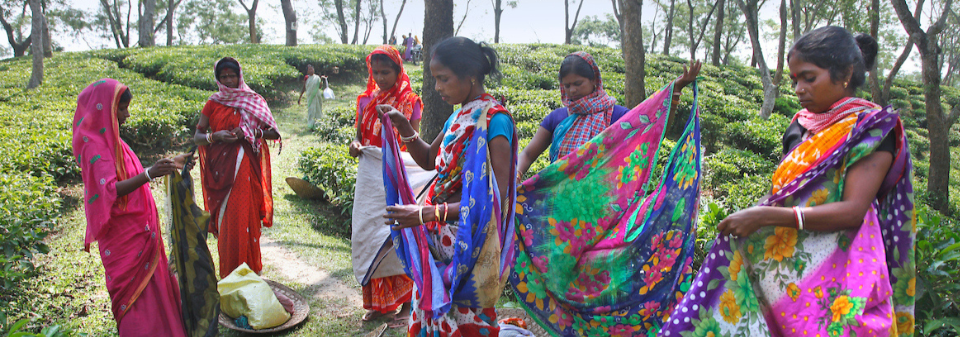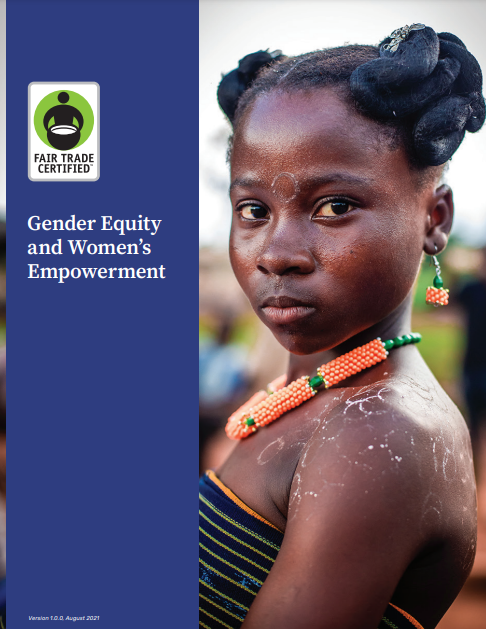
Celebrating International Women’s Day and Fair Trade
For over 24 years, Fair Trade USA has worked to provide opportunities for systemically marginalized individuals and communities to gain access to markets on a fair playing field – unlocking the ability to lead themselves to the future they envision. By providing tools and resources that strengthen communities and supply chains, farmers, workers, and fishers are able to stabilize income and invest in what they identify as their biggest needs.
Determined to ensure that no one is left behind, fair trade standards require equity among all participants. In many cultures and communities, women are not afforded equal or to participate in leadership roles. By requiring that women have access, voice, and agency in standards that are measured and audited against, the inclusion of women’s leadership and voices are driving exactly the kind of increased benefit that one would expect.
Much of the world now recognizes the extraordinary hurdles that have been placed in the path of solving our most pressing issues by the historic and systemic suppression of women. While infuriating to consider how much opportunity-loss the world has suffered by not embracing the value of women’s leadership, 2015 was one milestone year for beginning to consider how the world can correct this global exclusion. That is the year that the United Nations released its “blueprint to achieve a better and more sustainable future for all.” The Sustainable Development Goals (SDGs) are a framework for peace and prosperity for people and the planet. The seventeen goals contain targets to be achieved by the year 2030, and SDG 5, Achieve gender equality and empower all women and girls, recognizes the critical role that gender equality must play if we are to achieve that ambitious agenda.
Fair Trade USA’s impact management system is designed to track, among other impacts, the direct and meaningful contributions that its standards make to six of the seventeen SDGs. Among those six is SDG 5. Included among the many Key Performance Indicators that are tracked to ensure and understand the impact of Fair Trade Certification on women, data is collected on:
- % of Fair Trade Committees that are representative of program participants’ gender
- % of female program participants who feel valued equally to their male counterpart
- % of female program participants with access to and decision-making power over credit
- % of female farmers who identify as a co-farmer of the land they farm
- % of female farmers that feel they had equal opportunity to be part of Fair Trade
- % of female workers who feel they are compensated for their work equally to their male counterpart
- % of female workers who feel they are able to start or grow their family while working at that job if they wanted to
The data helps ensure that women are gaining increased opportunity to participate as fully as they would like, and the results so far are inspiring. As part of its monitoring and evaluation process, Fair Trade USA conducts interviews that allow individuals to share, in their own words, the changes that they have experienced in their personal lives, work environments, and communities since joining fair trade. Of the many stories that have surfaced on the topic of gender equality in Fair Trade Certified supply chains, the story of Roma Gonju and Suma Mal are among the most illustrative of the impact that the entire community can experience when systems are set up to allow women to succeed and have a voice.

Shyamsati Munda (left), Mallika Murah (middle) and Santana Boraik (right) display a bag filled with freshly plucked tea leaves at Jalinga Tea Estate, a Fair Trade Certified tea garden at Jalinga in Assam, India.
Both Roma and Suma are tea pluckers on a sprawling tea estate in Assam, India. They each learned about fair trade shortly after beginning their time there, Roma hearing about the shared responsibility that the workers felt to their community from long-tenured pickers and fair trade committee members. Suma was approached by members of the fair trade committee as well, who make it a priority to ensure that new workers are aware of the program and how it can benefit everyone.
Roma and Suma both reported that when they joined, the community was facing health issues due to a lack of infrastructure to ensure clean, potable water. People bathed in the river, but without toilets, the river was not safe. There were chronic issues of stomach-illness and diarrhea that too frequently kept children out of school and kept workers from being able to earn a living.

Local women from nearby villages retrieve water for daily use from one of the hand pumps that was installed using Community Development Funds.
Women holding leadership roles are uncommon in this part of India, according to Lutfur Rahman, Field Advisor to Fair Trade USA. Lutfur is from Assam and primarily works with fair trade tea gardens and workers in the tea community. It is most common for men to work in factories, which tend to be higher paying jobs, while women work in the tea fields. Lutfur shared that it is never easy for a woman to achieve a leading role in governance structures, and even more so in tea gardens due to poor literacy and long workdays. Women are also the primary caregiver for children and do nearly all household work. He shared that culturally, men rarely do work in the household and that is especially true in Roma and Suma’s community. “So, coming from such an environment, and working for the society by getting into the governance system is quite a journey for these women.,” according to Lutfur.
And that is exactly the journey that both Suma and Roma took. Shortly after learning about fair trade and how it works, both were elected to the Fair Trade Committee. In this new role they advocated for projects to solve the water problems the community faced. With the community’s support, they first invested in water filters for everyone’s homes. Following that, they launched a project to sink deep-well hand pumps with filters unlocking even more access to clean, potable water. They report that the water-related illnesses that plagued the community are now behind them.
Suma also reported that there were other sanitation issues such as trash and litter that is now collected, and that there was a lack of reliable shelters during monsoon season which the community has now rectified through Community Development Funds generated through fair trade. Other projects since they joined the committee have included building new bridges and roads. Workers report these as critical as it has enabled them and their families to get to work and school reliably, as they were in disrepair causing education and work attendance to suffer.
Perhaps one of the most telling interviews illustrating the impact of the leadership that these two women have had on their community came from a male plucker on the estate. When asked about the most significant change from fair trade, his response was that the biggest impact has been interaction with management. Especially that women can now interact with management. “When workers talk to management, they become leaders. A lot of the women have become leaders too. Two women at have even become political leaders who ran for office in the election.”
Those women are Roma and Suma. After finding their voice in the Fair Trade Committee, both ran for elected office in Gram Panchayat, the village council, and won. Lutfur again stressed how rare this is. As members of this council, Suma and Roma help determine how tax dollars are spent on behalf of the community. Once a year on October 2nd, Mahatma Gandhi’s birthday, the Gram Sabha (the general assembly of all community members of voting age), meets. On this day, all villagers participate in planning development work for the village. These development projects include road construction, drinking water projects, school construction and improvements, and other community infrastructure priorities.
And beyond their personal journeys, Roma and Suma have also leveraged their leadership positions to ensure that they are creating similar opportunity for other women in the community. With their terms in Gram Panchayat ending in 2023, they have helped create government programs for women’s empowerment in the community. These include workshops on financial literacy and investment, as well as a small-lending program for women drawing on a revolving rural development fund.
Back at the tea garden they also have continued to support youth and are working on computer education programs in their schools.
In a region where women have traditionally and culturally been kept at the margins, there is no doubt that the standards and structures built into the fair trade system have helped set up a framework to expand representation and leadership opportunities. When asked about the most significant changes from fair trade, so many workers– both women and men alike – cited women’s empowerment. There are many metrics and indicators that are tracked to determine the efficacy of fair trade, and yet we know that concepts like “empowerment’ or “equality” are often more qualitative than quantitative. It is through pairing those measurements with stories like those of Roma and Suma that we are truly able to gauge the ripples of impact that go beyond the numbers. When entire communities begin to re-examine how view gender roles and what leadership looks like, we begin to see how achieving the Sustainable Development Goals and securing a more equitable future is possible.
Fair Trade USA’s Approach to Gender
Gender equality and women’s empowerment are core to the fair trade model and essential for sustainable change and impact. View the position paper, Gender Equality and Women’s Empowerment, to learn more about the role of women in the production system and the challenges they face, our three-pronged approach to gender, and how we evaluate fair trade’s impact for women and girls.
